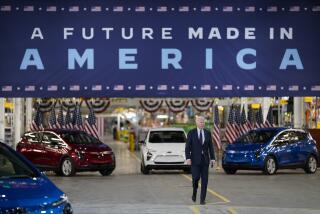Hybrid vehicle sales speed up
When Ferrari’s biggest and baddest supercar is a hybrid, you know the world has changed.
Once considered the province of techies and the eco-friendly, hybrids are catching on in almost every vehicle segment.
Hybrid sales were up 32% in the first two months of this year compared with the same period last year, according to research firm Autodata Corp.
That’s driven by a combination of trends, including upward-creeping gas prices, a growing track record for reliability and the wider selection of hybrid offerings — everything from the entry-level Toyota Prius C to the spacious Ford Fusion sedan to the LaFerrari, a 949-horsepower, million-dollar monster.
Market share for all hybrids had been stalled at less than 3%. It has recently crept up to 4% and could double by the end of the decade, said Thilo Koslowski, an analyst at Gartner Inc.
“Hybrid technology has certainly reached the inflection point,” Koslowski said, “and is being taken seriously by virtually all the automakers.”
The vehicles use at least one electric motor to assist a primary gasoline engine, particularly in fuel-sucking situations such as taking off from a stoplight. The cars also capture electricity when they slow down and store it in a battery. Some can run on electricity alone for varying distances. Their fuel economy can be more than 40% better than the conventional gasoline version of the same model.
Already, hybrids are ubiquitous in California, the nation’s largest auto market. The Toyota Prius overtook the gas-only Honda Civic last year as the state’s bestselling vehicle.
Automakers say the success of the Prius has helped fuel interest in hybrids nationwide.
“Gas prices are part of the equation, but it’s more about having the product in decent numbers,” said Jason Mosley, general manager of AutoNation Ford in Houston. The dealership’s sales of Ford’s hybrid cars are up 400% from a year ago.
Ford’s new hybrids are selling to car shoppers such as Paul Cunningham, an insurance industry executive from Encino who bought a hybrid Fusion last month.
“I really like the design of the Fusion. I like the idea of hybrid and saving money on fuel with the current gas prices,” Cunningham said. “I also like the idea of buying an American car.”
Cunningham’s Fusion is getting about 42 miles per gallon, about double the fuel economy of the Saab it replaces.
Now the Cunninghams are a two-hybrid family. His wife, Sherri, drives a Prius.
“The public has embraced these technologies because they have proven to be reliable and efficient,” said Ed La Rocque, Toyota’s brand manager for advanced technology vehicles.
Even so, hybrids most likely will account for a comparatively small portion of auto sales for years to come.
“A lot of it still depends on fuel prices,” La Rocque said. “If we get up above $5 or $6 a gallon, we will see a dramatic change.”
Some would-be buyers have been reluctant because they worry that the batteries will have to be replaced or that the cars will experience technical problems with their multiple drive systems.
But this hasn’t proved to be the case so far. Toyota says 90% of the Prius cars it has sold since introducing the model to the U.S. market in 2000 are still on the road.
“That’s why you see so many Prius taxicabs,” La Rocque said: If the cars were unreliable, he reasoned, taxi services wouldn’t use them.
Another drag on sales is the higher sticker prices.
The Toyota Camry hybrid is about $3,500 more than a similarly equipped gasoline-only Camry. At current California gas prices, it takes almost five years of fuel savings to make up for the higher price.
Ford’s Fusion hybrid carries a similar price premium but has a payback at least a year faster because of the bigger difference between its fuel economy and that of the conventional Fusion, according to the Environmental Protection Agency.
At the same time, gasoline-powered cars are becoming more competitive.
“The fuel economy on gas engines is getting better. There are some new diesels coming out that get great mileage,” said Jessica Caldwell, an analyst with auto information company Edmunds.com. “Americans want fuel economy no matter what, and they aren’t that picky about where they get it.”
What’s helping the hybrid market most is that more automakers have embraced the technology.
Nissan dropped out of the hybrid market several years ago, but it showed off a hybrid version of its new Pathfinder crossover at the New York Auto Show last month. Honda will launch a hybrid version of its Accord this fall, which according to the EPA will have a class-leading fuel economy rating of 49 mpg in city driving. Toyota is seeing some early success with sales of the hybrid version of its full-sized Avalon sedan.
“With more entries — products that are not so much a science experiment, but rather are real cars and give you the full vehicle experience — we are seeing customers select hybrids,” said Nancy Lee Gioia, Ford’s director of global electrification.
Since September, Ford has become Toyota’s toughest hybrid competitor by launching the new Fusion hybrid and its C-Max, a smaller hatchback hybrid that competes with the Prius V station wagon.
Ford is now selling 3,000 to 4,000 of each of the vehicles per month in the U.S. and has jumped to 17% of the nation’s hybrid market in February, from 5% in the same month last year. Much of that market share has come from Toyota, which has seen its hold on the market drop to 63% from 72%. But both automakers are sharing a bigger pie.
“That’s what this market has needed the whole time,” Caldwell said. “More exposure of consumers to cars other than just the Prius.”







